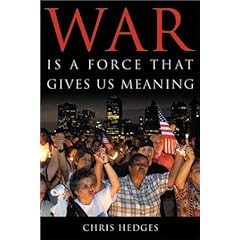 It's been a little overwhelming, frankly, the amount of new stuff I've absorbed this last few weeks. Thanks to all the regulars, new and old, who have really opened some new ideas and ways of seeing/listening to me here. I'm kind of playing catch-up...
It's been a little overwhelming, frankly, the amount of new stuff I've absorbed this last few weeks. Thanks to all the regulars, new and old, who have really opened some new ideas and ways of seeing/listening to me here. I'm kind of playing catch-up...I recently read Chris Hedges War Is a Force That Gives Us Meaning, which came out in 2002. It's premise is that war is Hell (nothing new there) and yet deeply seductive, even to those who have lived it. It is not an especially structured book, but that's OK. It swept over me.
One thing I was reminded of in reading Hedges' book was the character Destruction in Neil Gaiman's Sandman. The premise of that series of graphic novels was a bickering family of "Endless," embodiments of forces which are within us and yet out of our control (cutely all have names beginning with D: Death, Destiny, Dream, Desire, Despair, Delerium (who used to be Delight), and Destruction). Destruction is the embodiment especially of war. But the character abandoned his work sometime in the early seventeenth century, as war came to be seen as a "science," instead of as a horseman of the apocalypse or Dulle Griet (in my mind's eye I conflate Dulle Griet with another Breughel painting, The Triumph of Death). It was no longer a force beyond human control.
Or so people wish to believe.
Hedges book to me effectively bridges that gap between war (and us-and-them conflict in general) as a force we are somehow unable to control, and the sort of scientific brutality that cartography (see, I knew we'd get back to cartography some time) has at times been party to. In particular, he looks at war's addictive qualities, and the ways in which frankly violent criminals are able to harness the seductive qualities of war for their own ultimately disastrous purposes.
As you can tell, I recommend it.

No comments:
Post a Comment